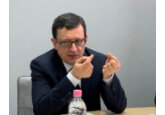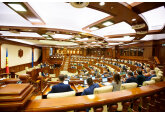
The CNA anti-corruption expertise revealed a number of flaws in the draft government decision on the conduct of an independent audit of Moldovagaz's debt to Gazprom.
According to the report of the National Anti-Corruption Center (CNA), these shortcomings can lead to corruption and must be eliminated. The first remark from the Report on the audit of Moldovagaz’s debt to Gazprom and final factors for gas supplied to consumers on the right bank of the Dniester refers to the fact that the law does not specify which "final factors" are subject to independent verification. And this ambiguity about the range of auditees can lead to corruption risks associated with the processes described in the regulation. In this regard, CNA recommends the author of the draft to clearly and unambiguously distinguish the circle of auditees. At the same time, the authors of the expertise claim that the draft also contains flaws in the procedure for selecting the company that will conduct the audit. As noted, unclear provisions on the procedure for public procurement of audit services can create risks of corruption and violation of integrity on the part of officials of the Public Property Agency responsible for implementing the norm. It is emphasized that, although the text of the draft is consistent and no contradictory norms or contradictions between its provisions and the provisions of other normative acts in force were identified, the document only partially meets the strict requirements of legislative technique and transparency in decision making, which are important conditions in the promotion of any normative act. Therefore, CNA recommends the authors to attach to the project materials within the dossier the minutes of negotiations on the settlement of natural gas problems, from which the need for an independent audit of Moldovagaz's debt to Gazprom is derived. In addition, CNA experts found risks in the draft government decision approving the procedure for granting advance subsidies for start-up projects from the National Fund for Agricultural and Rural Development. CNA notes that the provisions establishing the conditions for providing grants are discretionary, and this contains the risk of corruption on the part of civil servants involved in the process of selecting grant recipients. At the same time, the expert report shows that some provisions are open to different interpretations. CNA experts argue that the lack of clear rules regarding the situations when a civil servant may refuse to provide a grant to an applicant, gives the official room for maneuver, and this is a serious risk of corruption. Therefore, CNA recommends that ambiguous wording be removed from the law. The two above-mentioned projects can be supported by CNA if all the recommendations put forward in the anticorruption assessment reports are implemented. // 29.12.2021 – InfoMarket







